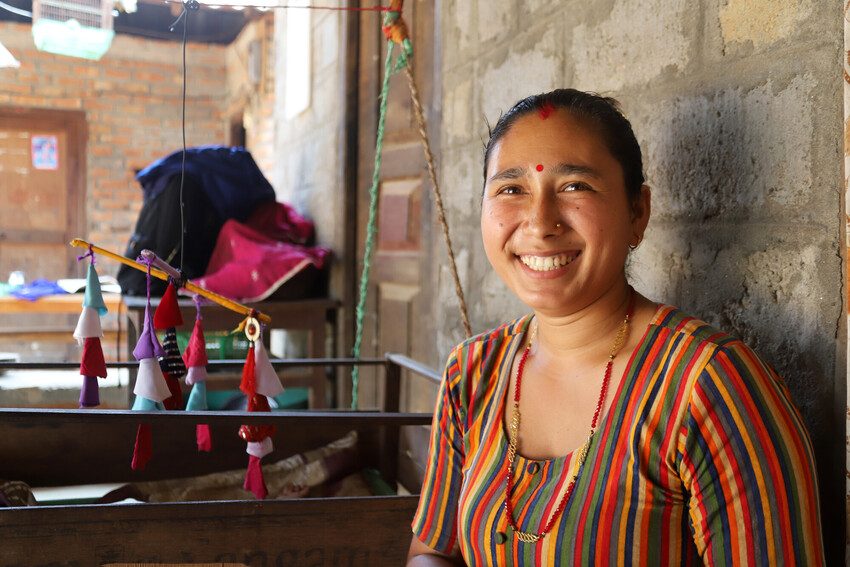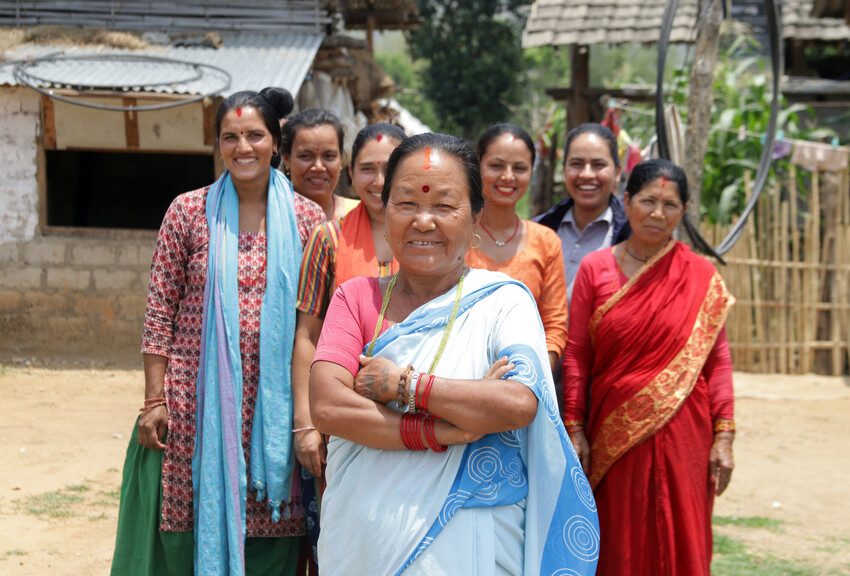Mothers learn positive parenting skills together
13 December 2023Kunta has benefited from positive parenting sessions, which teach mothers new skills and knowledge, helping them break free from the gendered norms and traditional attitudes that hold them back.
26-year-old Kunta is the mother of two beautiful sons aged five years and nine months old. Married when she was 19, she gave birth to her first son three years later and admits that she was completely unprepared. “I didn’t have any idea how to take care of a child by myself. My mother-in-law stayed with me for a couple of months to help look after my son.”

Kunta explains that she followed her family’s traditional customs while she was pregnant, but the guidance she was given was not always correct such as being told she could not eat fish, meat, or any dairy products.
“I was malnourished during my first pregnancy. I didn’t gain weight and could not produce enough milk for my child. Up until today, my first child is not able to gain any weight and is tired most of the time.”
During her pregnancy, Kunta was visited by community health volunteer Dil Maya Thapa Magar, who immediately recognised that she was malnourished. “Kunta was weak and could not visit the health centre regularly. I used to go to her home and provide her with iron and calcium tablets.”
Once she gave birth to her son, Kunta’s mother-in-law quickly took charge and started to feed her newborn grandson solid foods such as haluwa (a pudding made of semolina, flour or lentils).
Although Dil Maya tried to intervene, her advice was not followed. “I frequently visited Kunta’s home and guided her with childcare information, but due to the traditional mindset of her mother-in-law, I could not do much.”
Unable to complete her education following her marriage, Kunta lives with her husband and children in a small rural community in Nepal’s Sindhuli District. Her husband works as a labourer and often comes home late at night. To contribute to the family’s income, Kunta runs a grocery shop next to their house.
Two years ago, Kunta was invited to join a mothers group meeting organised by Plan International in partnership with HANDs Nepal. Forming part of the Child Dream project, we are supporting parents, caregivers and community organisations to provide children with the care and services they need to grow up healthy and reach their full potential.
“Joining the mothers group was the best decision I ever made. I joined before my second pregnancy which helped me to openly discuss and plan with my husband before, during, and after my second child was born,” explains Kunta.

“At parenting sessions, I learnt new skills such as using old clothes to make toys for my children. I learnt about the importance of stimulating the five senses for my child’s overall development. I chose colourful clothes for the toys, spoke to my belly during my pregnancy, ate nutritious food including fish and meat, and listened to all the stories and songs.”
Targeting pregnant women and young parents of children under the age of three, the positive parenting sessions teach mothers new skills and knowledge, helping them break free from the gendered norms and attitudes that hold them back.
“Each mother shares their experiences during the weekly meetings. I am learning from them and use some of their ideas in my home. I now understand the importance of education for my children and want to create a positive learning environment for them,” Kunta says.
“After attending the meetings for a few months, we discussed fathers and their positive engagement in children’s early development, maternal mental health, and well-being, as well as community support. After this, I asked my husband to join the parenting sessions with me.”
Kunta says that when her husband started attending the classes, he began to change his behaviour. “He helped with household chores and stopped selling cigarettes in our shop as people used to buy and smoke them in front of me which was not good for the baby’s health.”
Dil Maya explains that she has seen a big change in Kunta since she started going to the mothers group meetings. “In the past when I used to teach Kunta five things about childcare, she only used to follow one. But after being part of parenting sessions, she does everything I instruct her to.”
Kunta and her husband now spend as much time as they can with their sons. Her husband says: “I try to return home as early as I can. Since my elder son goes to school, I enjoy singing his school songs, reading bedtime stories, and showing him how I work with his mother.”
“I have now stopped using bad language and shouting at Kunta. Instead, I take him to the market and festive events so that we can both enjoy our time together. The parenting sessions have given me a new sense of responsibility towards my children and wife.”
Kunta says she and her husband have recently decorated their son’s bedroom, putting up colourful pictures with positive messages. “I help my elder son to draw and colour his homework. I collect his drawings and put them on the wall to show my appreciation. He loves it when I do that.”
About the project
The Child Dream project is being implemented in five districts of Nepal; Makwanpur, Sunsari,
Jumla, Bardiya, Sindhuli, in more than 300 communities across ten municipalities. The project targets pregnant women and young parents of children under the age of three. Positive parenting sessions are conducted to teach parents new skills and knowledge.
In the ten municipalities, volunteers who were trained to facilitate parenting education sessions are now supporting municipal level positive parenting steering committees. Trained community members work together to promote best practices and create enabling environments for early years children.


